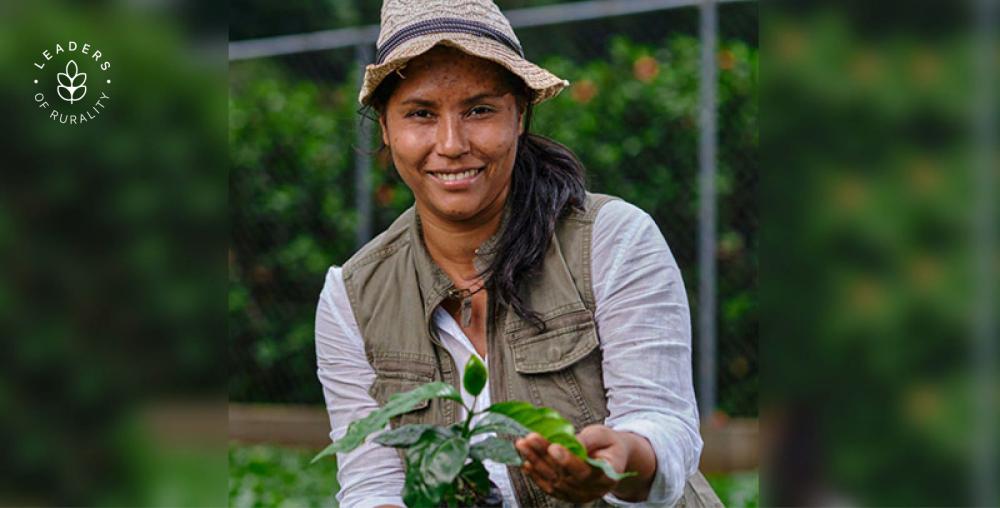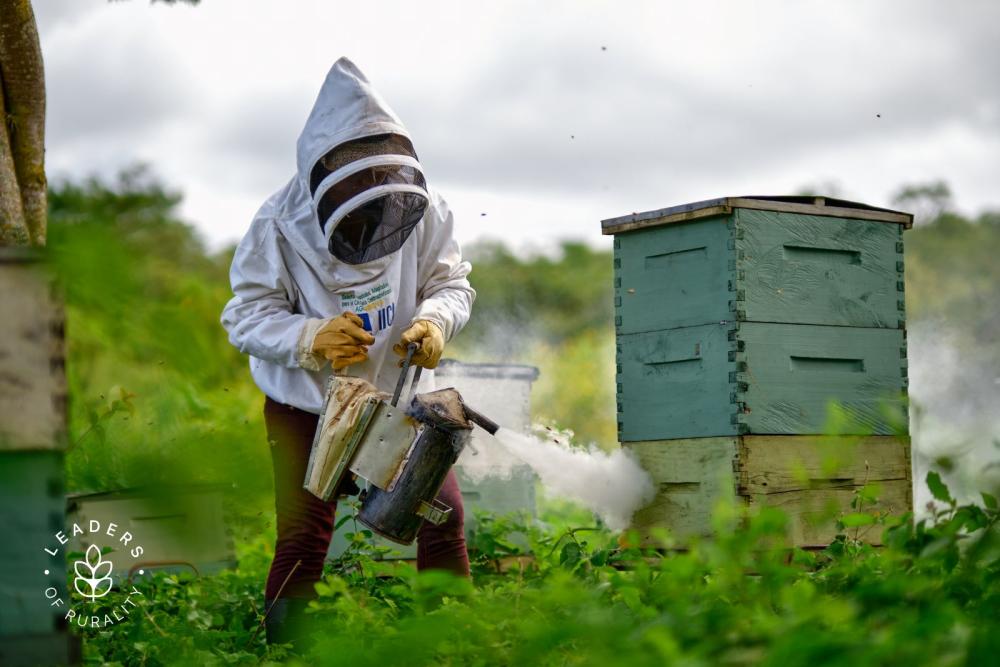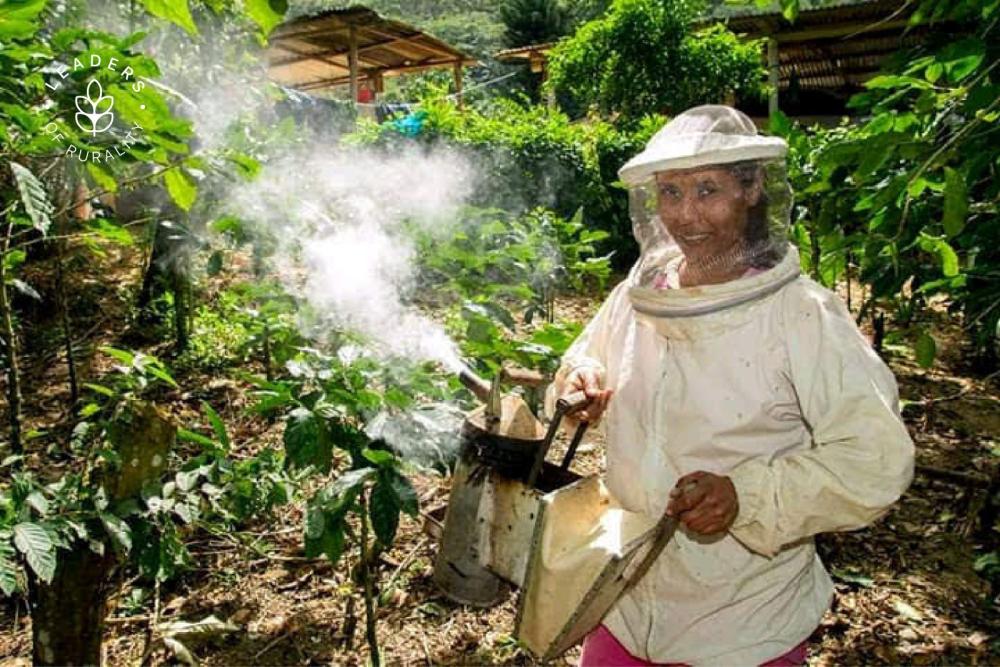Katy is part of a group of rural women from the department of El Paraíso, in eastern Honduras, who left the countryside, graduated from university, and returned to their first love, coffee growing. These women also began other productive activities such as beekeeping and growing bananas and lemons through the cooperative enterprise “Women in Action.”

Tegucigalpa, July 10, 2024 (IICA) – Katy Moncada, a Honduran farmer born in the countryside who moved to the city to study and then returned to her land to lead a women’s farming enterprise, has been honored as one of the “Leaders of Rurality of the Americas” by the Inter-American Institute for Cooperation on Agriculture (IICA).
In recognition, Moncada will receive the “Soul of Rurality” award, which is part of an initiative by this organization specializing in agricultural and rural development to acknowledge the work of men and women who make a difference and leave a lasting impact in the rural areas of the Americas, crucial for food and nutritional security and environmental sustainability.
Katy is part of a group of rural women from the department of El Paraíso, in eastern Honduras, who left the countryside, graduated from university, and returned to their first love, coffee growing. These women also began other productive activities such as beekeeping and growing bananas and lemons through the cooperative enterprise “Women in Action.”
The work was supported by technical cooperation from IICA and the Progresa program, a public-private initiative implemented by Swisscontact alongside the Honduran Coffee Institute (IHCAFE), Molinos de Honduras, the Ministry of Agriculture and Livestock, and local governments.
“We owe a lot to IICA,” she explains. “They helped us apply good agricultural practices and achieve results. We also learned a lot with the Progresa initiative, where we had meetings and training courses.”
She received a demonstration plot through the AGRO-INNOVA project, funded by the European Union (EU) and implemented by IICA, where she planted bananas, lemons, corn, and beans, and increased her apiary to 70 hives. This taught her the value of productive diversification for income generation.
The AGRO-INNOVA project was pioneering in the area, providing technical assistance and support to producers.

Katy is convinced that the work carried out by her group is meaningful, especially if it serves as a positive example for others: “I want all women to see what we do in Women in Action, and realize that it is possible, that they can achieve what they have set out to do. Many are afraid because they don’t have formal studies. But it is not necessary to study to be a beekeeper; it is all about changing the mindset.”
“I work hard. I get up every day at 4 in the morning, load the car with bananas, coffee, honey, and go to the market. I want to be more influential in the community so that people can see things differently. We must spread the word that it is possible to achieve things right here in Honduras, instead of always looking to the north. If my mother could survive 71 years in a rural setting, it’s because it is possible. It’s not about wanting to get rich overnight, but about working and striving,” she added.
The Leaders of Rurality of the Americas award pays tribute to those who are playing a unique dual role, both as guarantors of food and nutritional security, as well as custodians of the planet’s biodiversity, by producing under all manner of circumstances. This IICA recognition also aims to highlight the ability to promote positive examples for rural areas in the region.
Different Cultures
Katy was born in the Buena Vista community, studied at a private institute in Tegucigalpa, returned to the countryside in 2016, and joined Women in Action, which had been established in 2012.
“Although the original Women in Action project was solely about coffee, in 2016 me and my husband started with beekeeping, little by little, first extracting honey from wild bees. Initially, we only produced eight bottles and gave them away, but we learned from older beekeepers and grew, until we became one of the largest honey producers in the community. We also became intermediaries, because other producers sell to us as well,” explains Katy, who now lives in the San Marcos de la Selva community, where her husband’s family is from.

Although in Buena Vista, where she was born, women have always worked in the fields, Katy claims that the culture is different in San Marcos.
“If you go looking for my mother or my aunt,” she says, “you will always find them on the farm pruning coffee. Women are generally rural women in our community. However, when I arrived in the community where I now live, it was frowned upon for a woman to work with men. There were women who never went out or only did so with a man’s permission. That’s why, with Women in Action, we have set an example to change these mindsets.”
There are 12 women and 10 men in her company, in an attempt to respect gender equality.
Today, one of the significant challenges facing productivity in rural areas of Honduras, as in other Central American countries, is the impact of climate change: “Many of us have lost our farms and must replant everything when the coffee dries up. But we always try to adapt and understand that diversification is essential,” she explains.
The main focus guiding Katy Moncada and her group is ensuring that young people take up agricultural activities.
“We need to focus,” she assures, “on generational renewal. We shouldn’t only think of adults as leaders. I always talk with children and young people, and I’m convinced that we shouldn’t criticize them for always being on their phones; instead, we should teach them to use it for something productive. Those of us who lead need to adapt.”
More information:
Institutional Communication Division.
comunicacion.institucional@iica.int
Photo Gallery











